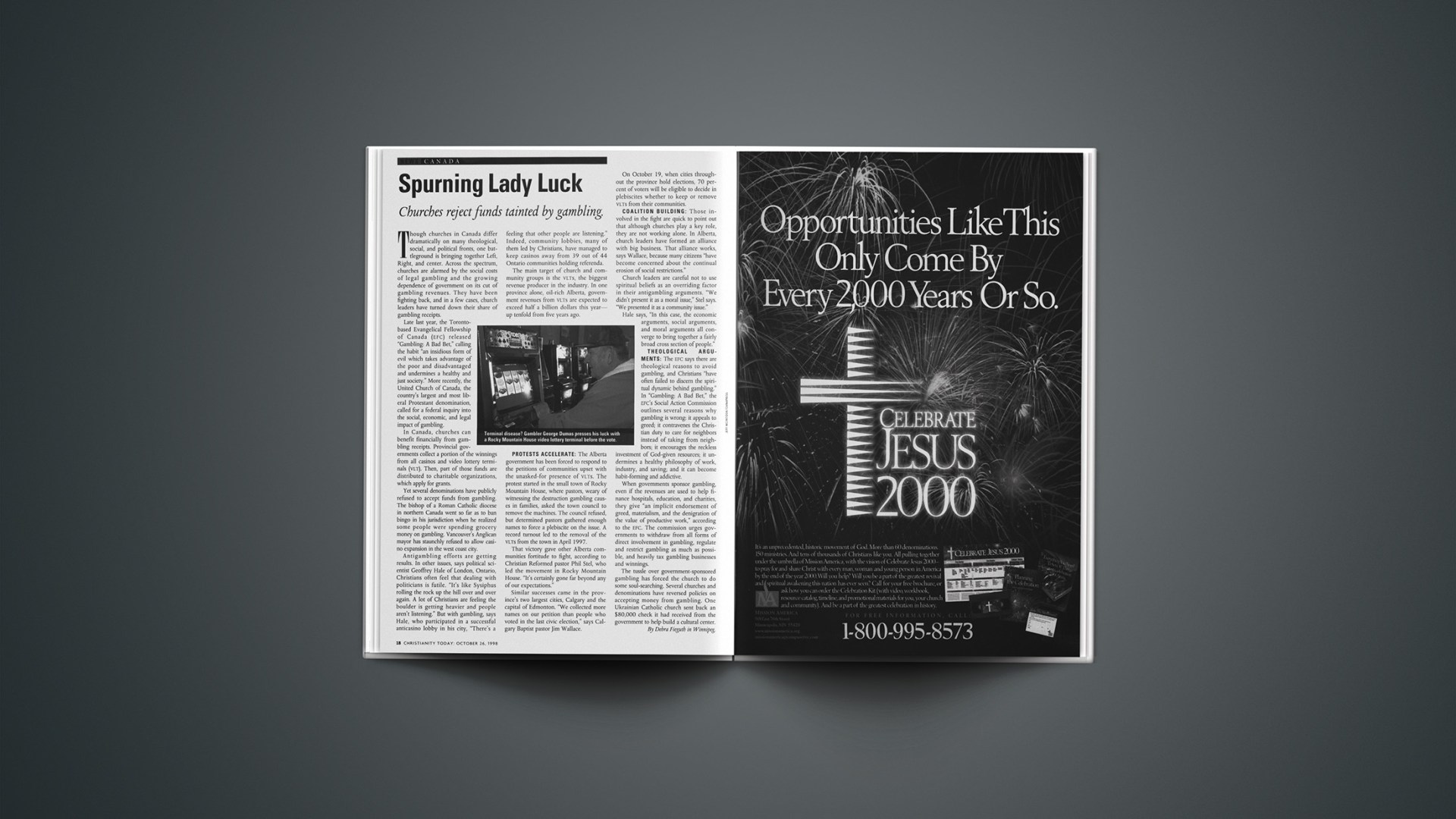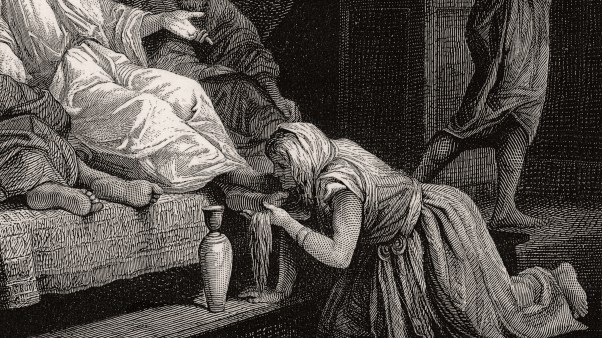Though churches in Canada differ dramatically on many theological, social, and political fronts, one battleground is bringing together Left, Right, and center. Across the spectrum, churches are alarmed by the social costs of legal gambling and the growing dependence of government on its cut of gambling revenues. They have been fighting back, and in a few cases, church leaders have turned down their share of gambling receipts.
Late last year, the Toronto-based Evangelical Fellowship of Canada (EFC) released “Gambling: A Bad Bet,” calling the habit “an insidious form of evil which takes advantage of the poor and disadvantaged and undermines a healthy and just society.” More recently, the United Church of Canada, the country’s largest and most liberal Protestant denomination, called for a federal inquiry into the social, economic, and legal impact of gambling.
In Canada, churches can benefit financially from gambling receipts. Provincial governments collect a portion of the winnings from all casinos and video lottery terminals (VLT). Then, part of those funds are distributed to charitable organizations, which apply for grants.
Yet several denominations have publicly refused to accept funds from gambling. The bishop of a Roman Catholic diocese in northern Canada went so far as to ban bingo in his jurisdiction when he realized some people were spending grocery money on gambling. Vancouver’s Anglican mayor has staunchly refused to allow casino expansion in the west coast city.
Antigambling efforts are getting results. In other issues, says political scientist Geoffrey Hale of London, Ontario, Christians often feel that dealing with politicians is futile. “It’s like Sysiphus rolling the rock up the hill over and over again. A lot of Christians are feeling the boulder is getting heavier and people aren’t listening.” But with gambling, says Hale, who participated in a successful anticasino lobby in his city, “There’s a feeling that other people are listening.” Indeed, community lobbies, many of them led by Christians, have managed to keep casinos away from 39 out of 44 Ontario communities holding referenda.
The main target of church and community groups is the VLTs, the biggest revenue producer in the industry. In one province alone, oil-rich Alberta, government revenues from VLTs are expected to exceed half a billion dollars this year—up tenfold from five years ago.
PROTESTS ACCELERATE: The Alberta government has been forced to respond to the petitions of communities upset with the unasked-for presence of VLTs. The protest started in the small town of Rocky Mountain House, where pastors, weary of witnessing the destruction gambling causes in families, asked the town council to remove the machines. The council refused, but determined pastors gathered enough names to force a plebiscite on the issue. A record turnout led to the removal of the VLTs from the town in April 1997.
That victory gave other Alberta communities fortitude to fight, according to Christian Reformed pastor Phil Stel, who led the movement in Rocky Mountain House. “It’s certainly gone far beyond any of our expectations.”
Similar successes came in the province’s two largest cities, Calgary and the capital of Edmonton. “We collected more names on our petition than people who voted in the last civic election,” says Calgary Baptist pastor Jim Wallace.
On October 19, when cities throughout the province hold elections, 70 percent of voters will be eligible to decide in plebiscites whether to keep or remove VLTs from their communities.
COALITION BUILDING: Those involved in the fight are quick to point out that although churches play a key role, they are not working alone. In Alberta, church leaders have formed an alliance with big business. That alliance works, says Wallace, because many citizens “have become concerned about the continual erosion of social restrictions.”
Church leaders are careful not to use spiritual beliefs as an overriding factor in their antigambling arguments. “We didn’t present it as a moral issue,” Stel says. “We presented it as a community issue.”
Hale says, “In this case, the economic arguments, social arguments, and moral arguments all converge to bring together a fairly broad cross section of people.”
THEOLOGICAL ARGUMENTS: The EFC says there are theological reasons to avoid gambling, and Christians “have often failed to discern the spiritual dynamic behind gambling.” In “Gambling: A Bad Bet,” the EFC’s Social Action Commission outlines several reasons why gambling is wrong: it appeals to greed; it contravenes the Christian duty to care for neighbors instead of taking from neighbors; it encourages the reckless investment of God-given resources; it undermines a healthy philosophy of work, industry, and saving; and it can become habit-forming and addictive.
When governments sponsor gambling, even if the revenues are used to help finance hospitals, education, and charities, they give “an implicit endorsement of greed, materialism, and the denigration of the value of productive work,” according to the EFC. The commission urges governments to withdraw from all forms of direct involvement in gambling, regulate and restrict gambling as much as possible, and heavily tax gambling businesses and winnings.
The tussle over government-sponsored gambling has forced the church to do some soul-searching. Several churches and denominations have reversed policies on accepting money from gambling. One Ukrainian Catholic church sent back an $80,000 check it had received from the government to help build a cultural center.
Copyright © 1998 Christianity Today. Click for reprint information.










